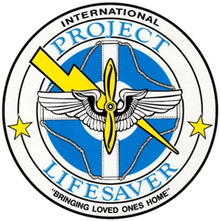Project Lifesaver

Project Lifesaver International is a non-profit 501 (c) (3) corporation founded in October 1998, by Chief Gene Saunders, regarded as the Father of, and subject matter expert on electronic tracking of persons at risk, and 2011 Presidential Citizens Medal nominee, in association with, the Chesapeake, Virginia Sheriff's Office. The copyrighted and trademarked organization was formed to develop a program for locating missing persons with dementia, Epilepsy, Alzheimer's disease, autism, Down syndrome and other related illnesses and is now regarded as the gold standard in the field. The program involves identifying at-risk persons of wandering by attaching a radio transmitter device to their wrist or ankle by way of a plastic or nylon wristband. The battery operated radio transmitter emits an inaudible pulse once per second, in the FCC allocated and licensed 216 MHz frequency range, that can be picked up by a receiver operated by trained and certified public safety officers.
Project Lifesaver, with offices in Florida and Chesapeake, Virginia provides training and support for public safety agencies anywhere in the world. Project Lifesaver assists agencies in establishing the program in their area, trains them to manage their at-risk clients by enrolling at risk persons, recognition of the disorders they may deal with and how to interact with them. These agencies are also trained in search techniques and use of the approved equipment. In addition, Project Lifesaver provides a secure, web based client management system for use by the agencies in the administration of their program.
Project Lifesaver utilizes radio frequency tracking technology, from several approved manufacturers, which is tested by member agencies before being approved for field use.
Project Lifesaver has seen, since its establishment, many other devices introduced to emulate it. However, it is still the only complete program, with prescribed training, procedures and certification.
As of January 23, 2012, another milestone was reached with 2,477 rescues in an average time of less than 30 minutes, normally using only two to three public safety responders.
Project Lifesaver, in addition, to its recovery program, also provides training for public safety personnel in dealing with the disorders they may encounter in their daily duties. The program is also recognized as an authority on searches for persons with Dementia or other disorders, not using the Project Lifesaver program, as well as, continually researching and offering new, additional technology to assist those caregivers and agencies dealing with these situations. It has also been hailed as a tremendous community relations program, bringing public safety and the community closer together.
The program is now in over 1,250 agencies covering 46 states, three provinces in Canada, one agency in Australia and Washington, DC. The program was founded and is administered by active and retired law enforcement officers, familiar with searching for missing persons. A milestone for the program occurred in October 2009, when the Bureau of Justice Administration awarded Project Lifesaver a grant totaling over $900,000.00. A second grant has since been awarded totaling over $500,000.00. These grants will enable the program to add over 150 new member agencies, while assisting agencies, already in the program, with advanced equipment.
External links
www.projectlifesaver.org Official website